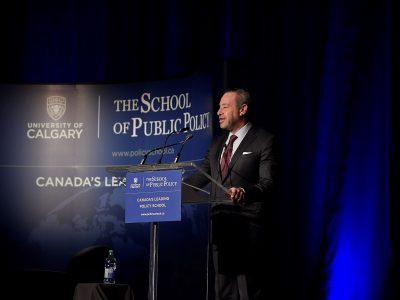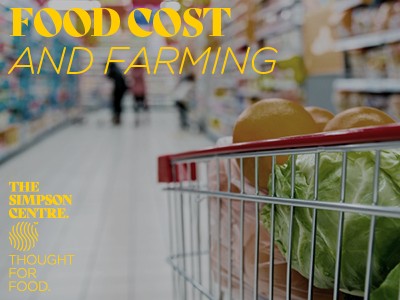Yedlin: Frum offers warnings, wisdom on Trump, trade and economic growth

The University of Calgary’s School of Public Policy is delivering on its promise to intellectually challenge Calgarians.
Its James S. Palmer lecture series honouring the former chancellor and his support for post-secondary education in Alberta exposes students, faculty and the community to eminent thinkers of international stature and discussion of important public issues.
The series’ 13th instalment this week featured author David Frum, the former speech writer for former U.S. president George W. Bush and outspoken critic of Donald Trump. His next book, Trumpocracy: The Corruption of the American Republic, is due out in January.
Frum’s thesis of what ails the world today, as he articulated Monday at MacEwan Hall, can be traced to income inequality brought on by slow economic growth and exacerbated by demographics, immigration policy and two economic crises.
This is the nub of what has brought on the dramatic rise of extremist parties in Europe, the pro-Brexit vote in the U.K. and the election of Trump, he said.
Canada, as a kinder, gentler and more risk averse nation, has largely escaped the extremist elements and did not feel the impact of the global recession or the European currency crisis as profoundly as the United States or Europe.
Frum said Canada should be studied as an example of what has gone right — in terms of successful immigration and economic policies.
“Studying the Canadian example can help illuminate the question … when three houses on the block are on fire and one is not, the house that is not on fire — you want to study that,” he said. “What did that house do, because it did not ignite and the others did.”
Part of what saved Canada, said Frum, was that the 2008 financial crisis — unlike prior downturns — was not accompanied by a drop in commodity prices.
That might be true for 2008, but the fallout from the 2014 collapse in commodity prices, most notably for crude oil, triggered a dramatic drop in the country’s economic growth. The fact interest rates remain low — the Bank of Canada left rates unchanged Wednesday — suggests the country has not fully emerged from the economic slowdown.
While Frum was focused on outlining the new world order in which the U.S. is noticeably absent from traditional roles — such as being more engaged with the Brexit talks involving Britain and the European Union — and the impact this could have outside European borders.
“Britain has made this fateful decision, but from the point of view of Canada, the United States and other trading partners, this negotiation has to go well,” Frum told an audience of business leaders — including former prime minister Stephen Harper — at a separate dinner Monday.
“It is going badly and there isn’t much time. It is the single most understudied, under-appreciated event. We watch as a spectator sport, as if the fate of the world’s largest trading region, which is what the European Union is, is something that doesn’t affect us.”
While the U.S. is absent from having any sort of role or influence during the Brexit talks under Trump, that’s hardly the case in the context of the North American Free Trade Agreement.
Frum’s advice was for Canada to concentrate on building alliances south of the border to fortify its position in the NAFTA talks.
“The most important foreign policy channel for Canada right now is to build alliances within the American political system,” he said. “Canadian governments don’t have a lot of room to move around. Canada has to make sure it does not get victimized by Donald Trump’s destructive trade policies and that is a very challenging problem.”
Despite that warning, Frum said he was “reasonably optimistic” the NAFTA renegotiation would have a positive outcome since the treaty has a lot of support within the U.S. political infrastructure, particularly among Republican governors.
With 2018 mid-term elections on the horizon, the prospect of lost jobs that would translate into lost votes and likely fewer elected Republicans in both the House and Senate, not to mention at the gubernatorial level remains highly likely if NAFTA is scrapped.
“I think it would be a difficult thing for Donald Trump to abrogate it, but as his political situation deteriorates in 2018, he will be lashing out in more and more desperate ways. On this front he can probably be contained by his own party,” said Frum.
His remarks came as Prime Minister Justin Trudeau was visiting China, with the stated goal of initiating talks that would lead to a free-trade agreement between the two countries.
In light of the uncertainty surrounding the renegotiation of NAFTA, Frum was of the view it “couldn’t hurt” Canada to look to form other trading relationships that would decrease dependency on trade with the U.S.
Despite the apparent lack of success encountered by Trudeau, there remains little doubt Canada needs to pivot economically eastward.
As Frum stated Monday, “as long as he (Trump) is on the scene, I don’t think anyone can feel overly secure.”
Frum is known for his cogent, incisive and often unforgiving analysis. His message Monday was both alarming and insightful.
In the true spirit of the Palmer lecture series, he left his audience with much to discuss and ponder.
Deborah Yedlin is a Calgary Herald columnist
dyedlin@postmedia.com
Source: Calgary Herald

